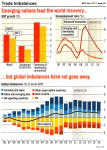
Following the global financial crisis, the extent of trade imbalances has eased somewhat between Advanced Western economies and the Emerging Asian economies.
The gap between China’s huge current-account surpluses and America is out-of-control deficits may have temporarily narrowed. But the IMF believes the massive disparity will return, as world economic activity improves.
The ups and downs of exchange rates and capital movements are seen by the US and the Western economies as a method of ensuring a proper allocation of resources.
Whereas, it seems Asian countries view exchange rate movements as an annoying distraction from controlled expansion of their “home” economies. And amassing foreign currencies is seen as the best protection against a re-occurrence of the 1997 Asian financial crisis.
How will this affect Commercial Property Investment?
China’s stated goal of 7% growth over the next five years (plus its dependence upon coal, iron ore, LNG and nickel) will provide enormous economic upside for Australia.
On this basis, China’s contribution to global economic output will rival that of the European Union within five years; and even the US, within the next 10 years.
While Australia’s mining boom may help to create a “two-speed economy” … the flow-through benefits will be felt by everyone — to a greater or lesser extent.
Clearly, the growing mining (and mining-related) sector will need to be physically accommodated.
Similarly, the support services and businesses like … accountants, lawyers and the merchant bankers … will all need to engage more staff. And that means we’ll need to construct more office buildings to house them.
Bottom Line: Until we do that (which can take between 3 to 5 years), rentals for both CBD and suburban Office space will continue to escalate those capital cities where the vacancy rates currently sit at around 7%, or below.
Therefore, right now, that means you should be looking to snap up something in Melbourne, Sydney or Perth. And then, ride the current growth cycle through to 2018.












